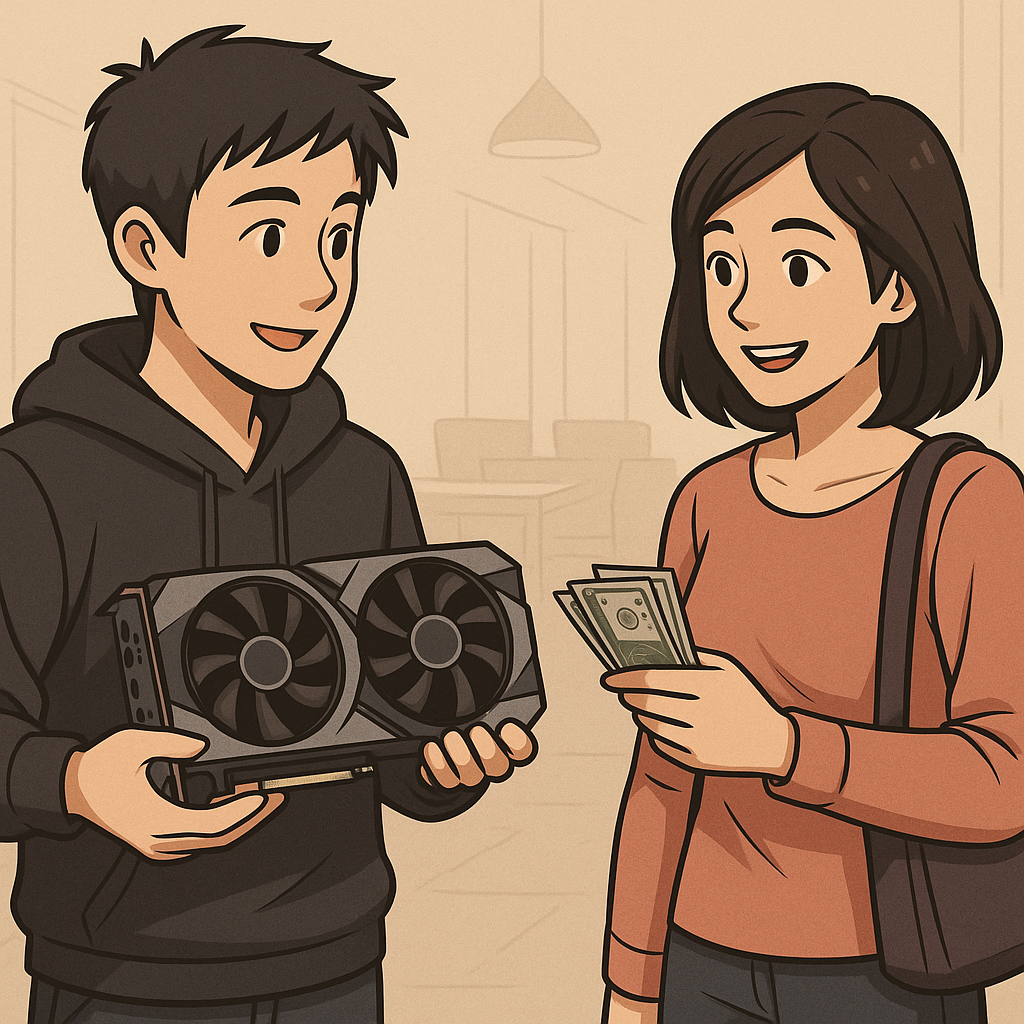Selling PC Hardware Peer-To-Peer
Selling your GPU peer-to-peer (P2P) can offer higher returns and faster transactions compared to other methods. However, this sales method comes with unique considerations that are crucial to navigate effectively. Here’s what you need to keep in mind when selling your GPU directly to another person.

If you’re up for a face-to-face meeting and have asked yourself, “Where can I sell my GPU near me?” then Peer-To-Peer could be your go-to. The advantages of peer-to-peer, p2p, marketplaces, including Facebook Marketplace, Facebook groups, Hardwareswap Discord, Anandtech, Letgo, Offerup, etc. are that you’ll get to keep more of the sale price because no one is taking a commission. You can pay to promote your post, but that is not usually necessary unless you want to sell ASAP. The numerous disadvantages include the safety and scam risks, the time wasted arranging meetups with flaky buyers or hagglers, no real seller protection, and a smaller pool of buyers.
Peer-to-Peer Transactions: Selling your GPU to a private buyer
Pricing Flexibility
In P2P transactions, buyers often expect room for negotiation. Set your initial price slightly higher than your ideal selling price to accommodate potential bargaining without compromising your bottom line.
Trust and Safety
When transacting in person, safety and trustworthiness are particularly significant in peer-to-peer sales:
- Public Meeting Places: Always choose a busy, public location for transactions, such as coffee shops or shopping centers. In smaller towns, we’ve often met with sellers at the local police department, and many police departments have an area specifically dedicated to providing safe peer-to-peer transactions.
- Verified Payment Methods: Opt for secure payment options like cash or Venmo/PayPal Goods & Services (the option with the fee). Avoid checks or other reversible methods to mitigate fraud risk.
Clear Communication
Transparent and prompt communication reduces misunderstandings:
- Detailed Descriptions: Clearly outline your GPU’s condition, benchmarks, any minor defects, and included accessories.
- Quick Response Time: Respond promptly to inquiries to maintain buyer interest and trust.
- Agree upfront on pricing: A common underhanded tactic involves showing up with less cash than the agreed-upon price and expecting the seller to accept less. There’s an entire subreddit dedicated to Facebook Marketplace transactions, and you can see plenty of examples.
- Phone calls may be a quick way to hash out details, but try to keep anything specific to the transaction in text by summarizing your conversation to make sure everyone is on the same page.
Post-Sale Responsibility
Unlike marketplace platforms, peer-to-peer sales don’t come with built-in support:
- Return Policies: Clearly state your return and warranty policies upfront to avoid disputes. Be aware that many people may be buying their first GPU from you, and, in our experience, there is a decent chance of user error during installation, including damage to the GPU, most commonly the PCIe pins or power input. While this is not your job to ensure they handle installation appropriately, an angry buyer with a broken GPU (even if they broke it and don’t realize it) is not fun for anyone. It is a good idea to try to get ahead of this unfortunate outcome beforehand by asking some questions to see if they know what they’re doing, and maybe send them a YouTube video on GPU installation.
- Post-Sale Queries: Be prepared for follow-up questions or assistance after the sale, ensuring smooth transaction completion and a good buyer experience.
Transaction Documentation
Keep clear records of your transaction details, communications, and payment confirmations. This can protect you in case of misunderstandings or disputes.
You can safely manage peer-to-peer GPU transactions with fewer headaches by proactively addressing these unique aspects.
Online Peer-to-Peer Marketplaces to sell your GPU
Facebook Marketplace & Similar Platforms
Facebook Marketplace remains the go-to platform for local, in-person GPU sales. It’s widely used and integrated directly into one of the most commonly used social networks, allowing for fast exposure and direct communication. Other platforms in this category, such as Craigslist, Letgo, and OfferUp, offer similar classified-style listings tailored to nearby users.
- Pros:
- No platform or transaction fees, allowing you to keep the full sale price.
- Easy-to-use interfaces with built-in forms and image upload options.
- Large local audience with immediate visibility.
- Ability to negotiate in real time via messaging.
- Cons:
- Higher risk of scams or lowball offers due to the unmoderated nature of listings.
- No built-in transaction protections or guarantees.
- Requires in-person meetings, which may be inconvenient or unsafe without proper precautions.
To mitigate risks, always meet in public places during daylight hours and avoid accepting digital payment methods that don’t offer seller protection. We also recommend reading our guide on common GPU selling scams and how to avoid them.
R/Hardwareswap (Discord and Reddit)
r/Hardwareswap is a long-standing tech-focused community on Reddit and Discord where GPU buyers and sellers connect directly. Known for its knowledgeable user base and dedicated moderation, it provides a more structured environment for peer-to-peer sales.
- Community Guidelines:
- Follow strict formatting for listings including timestamps, item descriptions, and pricing.
- Use PayPal Goods & Services exclusively for buyer and seller protection.
- Verification steps are required for new members to build community trust.
- Pros:
- Community familiarity with GPU specs, usage, and performance.
- Transparent reputation tracking via Reddit karma and feedback threads.
- Less chance of dealing with uninformed buyers.
- Cons:
- Buyers expect competitive pricing and may push for below-market deals.
- Navigating disputes through PayPal can be time-consuming and bureaucratic.
- Sellers must maintain a strong transaction history to retain good standing.
As of June 2023, Hardwareswap shut down on Reddit but their Discord is still active. And now they’re back in 2024!
Paypal payment risks with private sales
While PayPal Goods & Services offers seller protection, it’s best suited for small, infrequent transactions. If you use PayPal regularly or deal with high-value sales, your account could be flagged for unusual activity, especially if it’s new or rarely used. In some cases, funds may be held for up to 180 days. We suggest waiting at least 48 hours after setting up a new account before accepting payments, and always reviewing PayPal’s dispute and buyer protection policies in detail.
Intermediated Peer-To-Peer Services
Some platforms offer a hybrid experience—combining peer-to-peer sales with intermediary oversight. These platforms charge a fee in exchange for services like payment processing, shipping coordination, and product verification.
- Swappa: Focuses on consumer electronics including GPUs. Offers direct seller-to-buyer transactions with identity verification.
- StockX: Known for sneaker and luxury item sales, but increasingly supports tech items. Emphasizes authentication and brand trust.
- Jawa: A newer platform aimed at the PC gaming and enthusiast crowd. Offers a curated space for GPU sales with tools built specifically for this market.
- Pros:
- Enhanced trust thanks to verified transactions and ID verification.
- Additional services such as return handling, payment escrow, or shipping support.
- Less pressure on the seller to manage every aspect of the transaction.
- Cons:
- Smaller buyer pools compared to mainstream marketplaces like eBay, which can make it more challenging to get a quick sale, especially for less in-demand or older GPUs. You may need to price your item more competitively or wait longer for the right buyer to come along.
- Platform fees associated with additional services, such as authentication, customer support, and shipping facilitation, which can cut into your profit margins but may be worth the peace of mind for some sellers.
- Dispute resolution can cause customer service headaches when dealing with general population hardware sellers. More established platforms like eBay have tended to perform better in this area, in our experience.
These intermediated services are ideal for sellers who prioritize transaction safety and support but are also comfortable with slightly more complex workflows or reduced visibility. They’re a middle ground between fully independent local sales and traditional e-commerce marketplaces like Amazon or eBay.
By understanding the differences between these peer-to-peer selling channels, you’ll be better equipped to choose the right platform that aligns with your risk tolerance, hardware quantity, time constraints, and desired return.
Your Personal Network

Family, friends, and colleagues may also be interested in your graphics cards. Especially if you’re a gamer and have gamer relatives and friends.
While you may be done with your hardware, it’s possible that someone you know would buy your old card. Expect to gain more goodwill than cash as you’ll likely want to sell at a “family & friends discount”.
